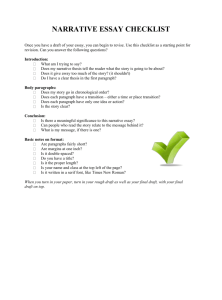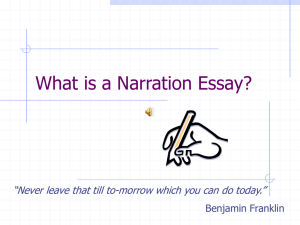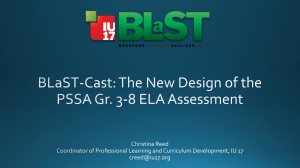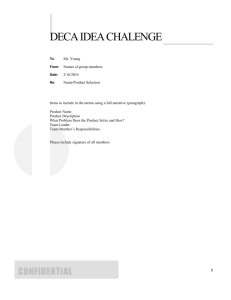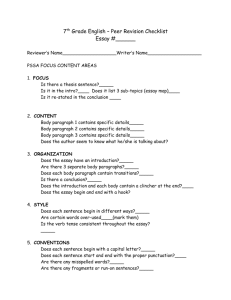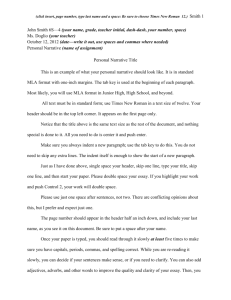ppt - Williamsport Area School District
advertisement
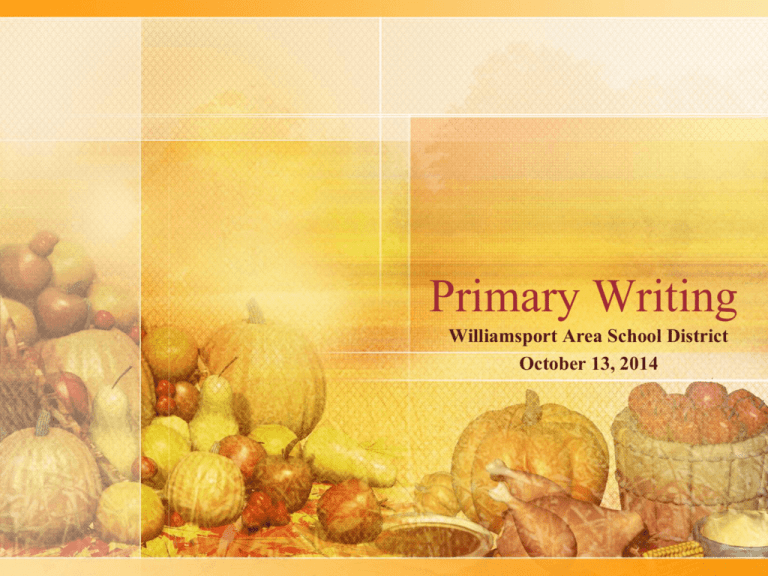
Primary Writing Williamsport Area School District October 13, 2014 Agenda • PSSA English Language Arts Test Design • Writing Overviews • Written Response to Reading – 3-Point Short Answer • Written Essay • WASD Primary Writing Continuum • Modes of Writing – Opinion – Informational – Narrative • David Matteson ELA Test Development Design At grade 3, the PCS‐ELA core can be described as: • 20 core passage MC items • 18 core standalone MC items • 2 core 2 pt EBSR items • 2 core 3 pt EBSR items • 2 core 3 pt SA items • 1 core 4 pt WP (weighted x2) Total 20 points 18 points 4points 6 points 6 points 8 points 62 points ELA Test Development Design At grade 3, the PCS‐ELA core can be described as: • 20 core passage MC items • 18 core standalone MC items • 2 core 2 pt EBSR items • 2 core 3 pt EBSR items • 2 core 3 pt SA items • 1 core 4 pt WP (weighted x2) Total 20 points 18 points 4points 6 points 6 points 8 points 62 points Students Write for Different Purposes and Audiences PRIMARY WRITING OVERVIEWS WASD Grade 2 Writing Overview IN EVERY UNIT 3 point short answer • Practiced weekly • Assessed minimally twice (2) • Treasures Weekly Assessment Open-Ended • modified to fit PSSA structure • Scored using PSSA Rubric *See weekly expectations in Writing Overview Student examples kept in writing portfolio WASD Grade 2 Writing Overview IN EVERY UNIT Written Essay 1 Essay developed over time • Modeled and Refined through Writer’s Workshop • 3 paragraph structure: Intro, Body, Conclusion • 1 paragraph Essay assessed “on-demand” per unit • Unit 1, 2, 3 (1) paragraph structure: Beginning, Middle, End • 3 paragraph Essay assessed “on-demand” per unit • Units 4,5,6 (3) paragraph: Introduction, Body, Conclusion Student examples kept in writing portfolio PRIMARY WRITING CONTINUUM Students write clear and focused text to convey a well-defined perspective and appropriate content. OPINION WRITING PA Core does not include Persuasive Writing • Grades 3-5 • Grades 6+ Opinion Argumentative Opinion, Persuasive, or Argumentative Opinion Writing • • • • • Focus Content Style Organization Conventions of Language Focus Content Style Organization Conventions of Language INFORMATIONAL WRITING Types of Informational Writing • How-To/Procedure • Report • Cause/Effect • Compare/Contrast Informational Writing… • includes only facts, not opinions. • tells about events in the order they occurred. • answers the questions who? what? when? where? and why? • often includes quotes or indirect quotes from people involved. Unpack the Standard Informational Writing • • • • • Focus Content Style Organization Conventions of Language NARRATIVE WRITING 2 TYPES OF NARRATIVE WRITING • Personal Narrative • Imaginative Fiction Personal Narrative • Personal point of view (I, me, my, mine) • Actual event or memory of writer • The focus is driven by emotion – writer expresses a strong feeling – writer expresses what he/she learns – writer expresses what he/she accomplishes Imaginative Fiction • Usually first or third person point of view (I, she, it, they, Marie) • Fiction, but may be based on actual events or memories • The focus is driven by tension of plot All Narrative Writing Involves • Plot • Setting • Character(s) • Passage of time – Uses temporal/transition words • Beginning, Middle, End (paragraph) • Introduction, Body, Conclusion (3 paragraph) • May involve dialogue Preparing for November In-Service with DAVID MATTESON • Teachers should first score their own classroom narratives, using the PSSA Narrative rubric • Co-scoring PLC meeting: – teachers should exchange a sampling (3-5) students responses and co-score with their grade level team • Teachers should reserve at least 3 student samples for the in-service with David Matteson. QUESTIONS

